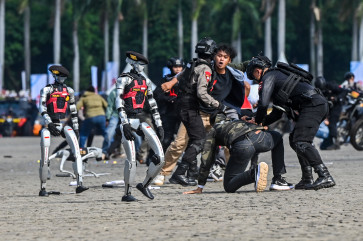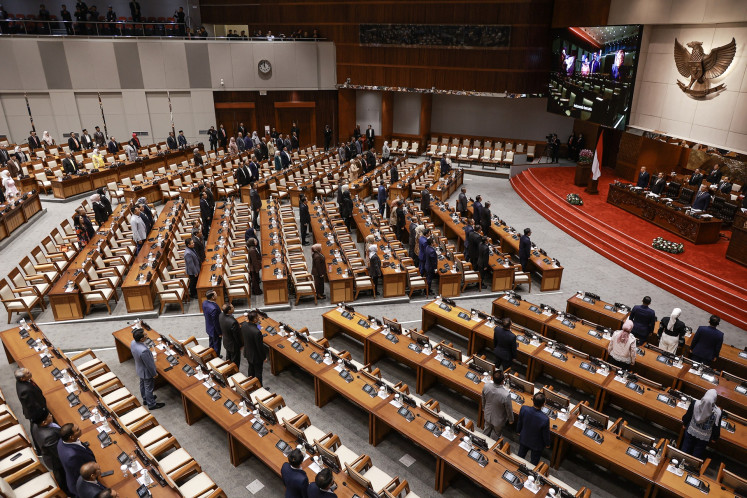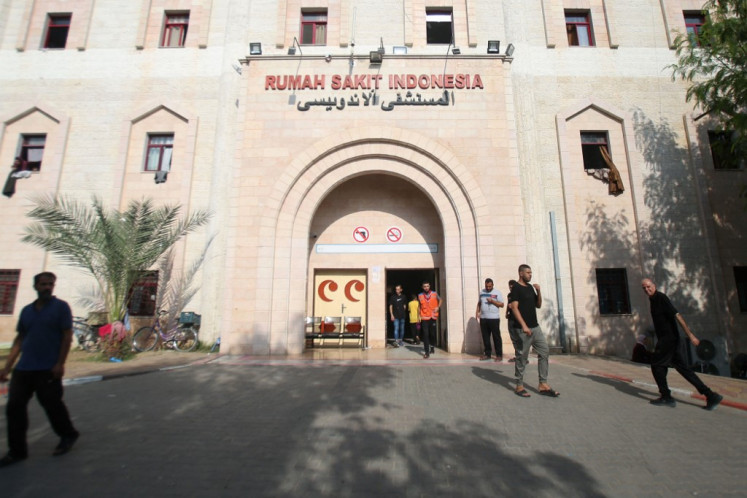Popular Reads
Top Results
Can't find what you're looking for?
View all search resultsPopular Reads
Top Results
Can't find what you're looking for?
View all search resultsRamadhan welcomed with various rituals
Night prayers: Muslims conduct tarawih prayers at Miftahul Jannah Mosque in East Jakarta on Sunday
Change text size
Gift Premium Articles
to Anyone
N
span class="caption">Night prayers: Muslims conduct tarawih prayers at Miftahul Jannah Mosque in East Jakarta on Sunday. The government announced on Sunday that this year’s Islamic fasting month would begin on Monday.(JP/Dhoni Setiawan)
Sudiro’s feet were burned and blistered after walking around 70 kilometers barefoot under the bright sun on Sunday.
The 21-year-old made the journey from his house in Cilacap to the grave of his ancestor Kyai Bonokeling in Pekuncen village, Banyumas regency, both in Central Java, to perform the unggah-unggahan ritual to purify himself before the first day of Ramadhan this year.
Sudiro said the unggah-unggahan, which means ascension, would cleanse him of the sins he had committed in the past year.
The ritual has been practiced by the local community for hundreds of years despite massive campaigns by certain branches of Islam to separate traditional culture and the practice of Islam in Indonesia.
“We enjoy doing the ritual,” said Sudiro on Sunday while showing off his burned and blistered feet.
“As Ramadhan arrives, we have to purify ourselves through this ritual,” said another Cilacap resident Kamsi, 32, who came with his wife and children to pray at the sacred site along with other community members on the first day of Ramadhan.
“They have to come here barefoot, they are not allowed to use vehicles and they must wear traditional Javanese outfits from when they leave their houses until they return home after performing the pilgrimage,” said Sumitro, 56, the community’s spokesman.
Each individual brings food as well as livestock, such as goats, to be sacrificed as part of the ritual.
Like the Bonokeling community, whose members are spread throughout the southern part of Central Java, especially in Cilacap and Banyumas regencies, Muslims nationwide will start fasting on Monday.
Unggah-unggahan was not the only unique celebration to take place ahead of Ramadhan.
In Semarang, also in Central Java thousands took part in the Dugderan parade to welcome in this year’s fasting month. Participants walked around 2 kilometers bringing along with them dozens of warak (animal effigies), which symbolize anger and worldly desires.
Warak have a head that resembles that of a dragon, the neck of a camel and the body of a goat and are covered in scales, a combination that displays a blend of Javanese and Arabic traditions.
In Yogyakarta, hundreds of people from Dlingo village, Bantul regency, performed the padusan self-cleansing ritual by showering at public bathing places as well as distributing apem cake, round rice-flour cakes .
“Padusan or cleansing is an effort to purity ourselves before the first day of fasting tomorrow [Monday],” said a local tourism agency official Samirin.
In Javanese culture, the distribution of apem cakes before Ramadhan signifies apology and cooperation among residents.
The government decided on Sunday evening that this year’s fasting month would start on Monday. The decision brings together the country’s two biggest Muslim organizations, Nahdlatul Ulama (NU) and Muhammadiyah, to start Ramadhan at the same time.
Muhammadiyah relies on hisab or astronomical calculations to establish the starting date, while NU follows rukyah or the sighting of the new moon.
After attending the Isbat meeting, Chairman of the Indonesian Ulema Council (MUI) Ma’ruf Amin, predicted that NU and Muhammadiyah would celebrate the Idul Fitri festival on the same day, which is predicted to fall on July 6 as earlier calculated by Muhammadiyah.
Despite the agreement between large Islamic organizations on the beginning of Ramadhan, a number of community members across the country celebrated the first day of Ramadhan two days earlier than the date set by the government.
The Islamic sect of Naqsabandiyah in Padang, West Sumatra, started fasting on Saturday, while the Naqsabandiyah Al Kholidiyah group in Medan began on Sunday.
Meanwhile, Hundreds of followers of the An Nadzir religious minority group in South Sulawesi also decided that the first day of Ramadhan would be on Monday, but used their own calculations, not those of the government.
_____________________
Syofiardi Bachyul Jb in Padang, Andi Hajramurni in Makassar, Apriadi Gunawan in Medan, Slamet Susanto inh Yogyakarta, Suherdjoko in Semarang contributed to this story.










